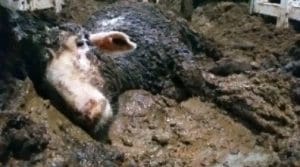
MLA managing director Richard Norton
FOOTAGE of dead and dying sheep on live export shipments would damage Australia’s brand as a clean, safe and ethical food producer and push more people to vegetarianism, Meat & Livestock Australia managing director Richard Norton conceded to a Senate Estimates hearing today.
Under intense questioning from senators from the Rural and Regional Affairs and Transport Legislation Committee, Mr Norton admitted he was shocked by the 60 Minutes footage of sheep suffering or dead from overheated and crowded conditions on Middle East shipments.
“Would this incident have an issue for a brand ‘Australia’ in global markets? Undoubtedly it would be naïve to suggest not,” Mr Norton said.
He said industry tells the MLA to ensure that Australia’s red meat brand is globally “at its fullest and most trusted that it can be.”
Mr Norton said he had never seen footage like that portrayed on 60 Minutes and it highlighted a “problem” and “major issue” for Australia’s industry.
“I don’t know how you could not be shocked by it at any level.
“I completely agree that industry had a big problem from those events, absolutely, and MLA’s role is to provide data and information back to industry around the impact of these situations,” he said.
Live sheep incidents would promote vegetarianism

Senate committee is told live sheep images will promote vegetarianism
Responding to a question from Justice Party senator Derryn Hinch, Mr Norton accepted that the live sheep export footage would push more Australians, especially young consumers, to vegetarianism.
“Absolutely, and I’ve got no doubt that it makes my life and my challenge to meet such a goal in how we give advice to people around strategies to achieve those goals much more difficult, there’s no doubt in the world.”
Mr Norton said industry had a major issue in re-affirming back to the Australian consumers that “please don’t punish Australian farmers in this situation”.
“By punishing Australian farmers it will have a negative income (impact) on the Australian community.”
He said the first round of consumer insight data domestically after the last (live sheep) incidents showed that Australian consumers understood what had happened “and perhaps understand that there is no point punishing Australian farmers.”
Mr Norton resisted efforts to drag him into discussions about MLA and the balance of live animal vs processed meat exports from Australia.
“The market forces determine the balance of the trades,” he said.
Mr Norton said it was MLA’s role to undertake levy fund project expenditure, marketing and provide consumer data and support market strategies as directed by the respective red meat sectors, but it regularly gives advice on industry risks.
Mr Norton said the Australian industry moved to a position of saying that farmers were “not at fault here.”
“The Australian farmers is appalled by what they saw on the TV as much as anyone else.
“MLA’s role is to assist industry as they see fit for MLA to assist.”
Mr Norton said the bulk of MLA’s off-shore marketing funds go into development of the chilled and frozen meat exports.
“The live export sector doesn’t quite have the availability of those funds.”

I can understand why farmers should be responsible for what happens to animals under their direct care, as should anyone who owns an animal. It is difficult to understand how a farmer can be responsible for an animal that is not under their care. I am disappointed by the footage and pleased that the government is imposing stricter regulations on the exporters. I want excellent welfare outcomes for the sheep.
I have stopped eating meat, as have most of my family, as a result of this last live export fiasco. We are disgusted with the whole supply chain. Farmers absolutely know what goes down on those ships and at the destination points. The exporters know and so does the crooked government department that not only turns a blind eye to the obvious cruelty, but funnels our tax payer funds into Asian and Middle Eastern companies that kill and then export our products globally.
Minister Littleproud has just given $146M to Vietnam abbotoirs. Why are tax payers — and lets face it, the bulk of tax payer subsidies come from urban tax payers — paying for foreign companies to profit from exported packaged product that could be done here in Australia, by Australian workers? Live export is killing local employment opportunities, export production that would boost our GDP and it is cruel.
Greed is the common theme that underpins this ghastly industry and it needs to take a good, long, hard look at itself. They have lost their social licence to operate.
I’m with Julie Smith. I haven’t touch all meat for eight years and I tell people to boycott meat. Let it rot on the shelves. I have lost respect for the so-called farmers and I know thousands of others. They have had over 15 years to sort this out I hope the so-called farmers and all those people in this vile trade have karma to them.
Consuming meat feeds the cruelty chain. If people want to eat meat then it should be processed here in a humane way. It is immoral to send live animals on the hazardous journey to the Middle East, summer or not. These animals have to stand the whole way and adjust their footing as the ship sways through the waves. Those that fall are trampled by others. They stand in their own excrement and face the blast furnace temperatures on the journey.
I think MLA will find that this outrage and heartbreak is not going away this time. And absolutely farmers are responsible; they supply the animals. Farmers and politicians will feel the pain from this — calls for boycotts are growing. Geoff Bilney’s comment is disingenuous, but I can see that this would be the farmers’ argument. But if the calls for boycotts extend to all Australian produce — and there’s no shortage of imported produce — perhaps that will make recalcitrant farmers wake up to themselves. Never underestimate the force of public opinion.
I also have proof that a number of Indonesian abattoirs who get Australian cattle have registered their own Indonesian brand name, but also include in large lettering that the contents is Australian Beef.
Julie Smith, where do you reckon the lamb that you didn’t eat went? Most likely onto a boat. Best thing you could do is consume more meat and create greater domestic demand leaving less animals to go live.
I gave up meat several years ago after watching the live exports scandal on Four Corners. It was the only protest I can make. Now I am inviting all my friends to give up eating lamb; as the only protest that we can make about this shocking degradation and betrayal of Australia’s standards and reputation as a decent country. It was not just one ship, it was several ships. And this shows it is systemic. It cannot continue, as it is not humane, no matter what so-called standards are put in place.
I would suggest there is also a brand issue with live animals being exported to the Middle East, and Cambodia I believe, and being slaughtered, packaged and on-sold as “Australian beef” or “Australian lamb”. Along with the potential for very serious blow-back for hygiene issues.